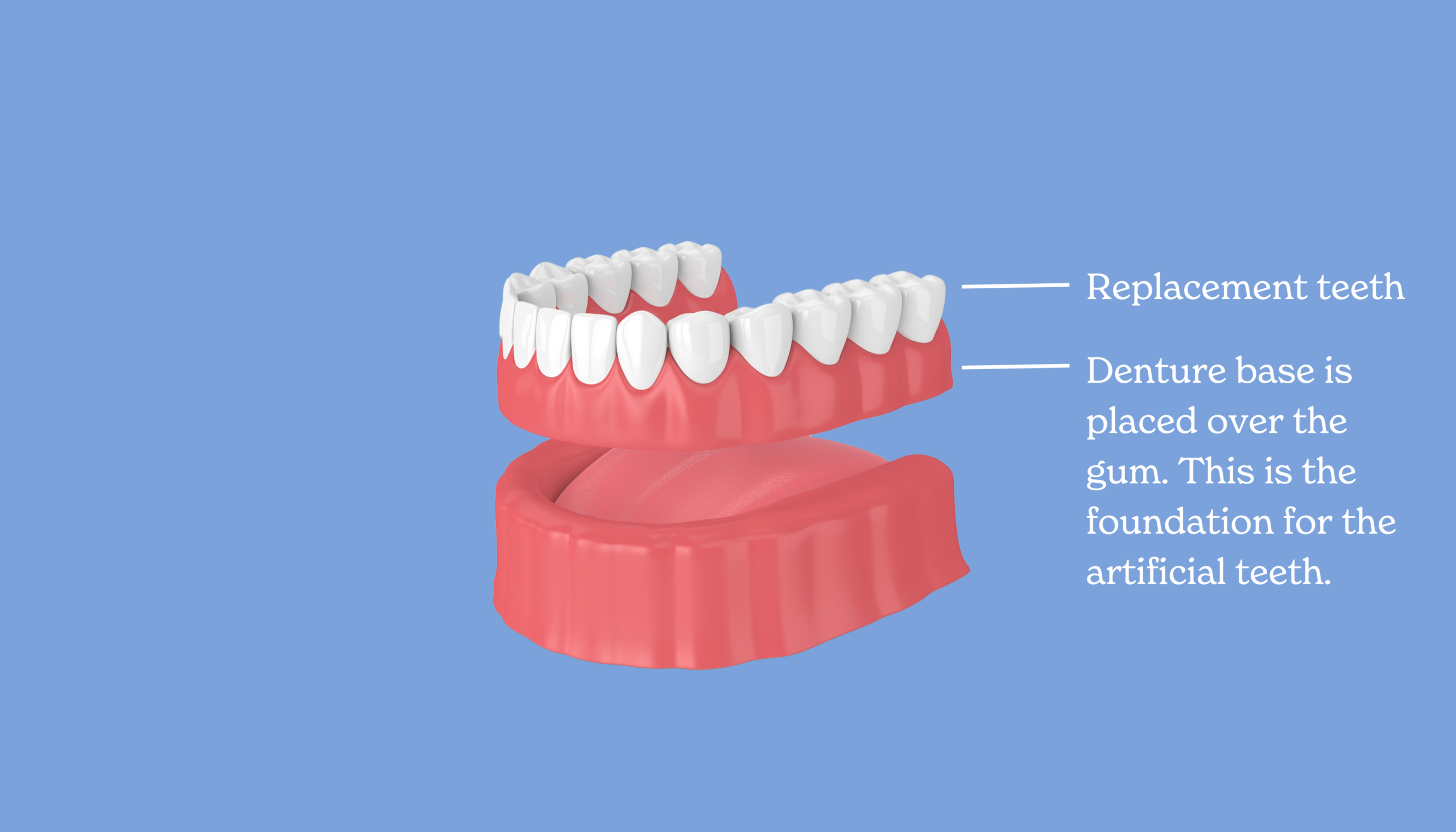Full Dentures
You might be surprised to learn that many younger adults wear full dentures as a solution for missing teeth. Dentures can be a cost-effective tooth replacement option for patients who have lost all of their teeth and can be removable or semi-permanent for people of all ages.
Book a general exam with your dentist today and discover what cosmetic treatments are available to you.

Compare cosmetic dental options
| Purpose | Advantages | Disadvantages | Lifetime | Procedure | Material | Cost | |
|---|---|---|---|---|---|---|---|
| Partial Dentures | A reliable solution for replacing missing teeth, helping you regain confidence in your smile and enabling you to enjoy a wider variety of foods. | Can be temporary or permanent for people of all ages. One of the most secure ways to fill gaps left by teeth that need replacing. | Require special care and cleaning to avoid bacteria build-up. May need to be replaced every few years to fit correctly. | 5 to 10 years. |
Generally require up to 4 appointments. Your dentist will take impressions of your mouth. Once the denture is made, a test fitting will ensure a comfortable fit, feel and look before a final fitting.
|
Generally made of acrylic resin or porcelain and will often use chrome framework for stability and strength.
While porcelain dentures, may last longer; acrylic dentures are usually stronger.
|
The cost of dentures varies widely depending on factors such as material, type (full or partial), and whether they are supported by implants (retained dentures). |
| Full Dentures | Can restore function when all of the teeth have been lost due to disease or damage. Help provide support to the facial structure allowing lips and cheeks to look fuller, resulting in a younger, healthier appearance. | A cost-effective tooth replacement option for missing multiple teeth. Available for both the lower and upper jaws. Option to have implant retained (permanent) dentures. | Require special care and cleaning to avoid bacteria build-up. Dentures need to be replaced every few years to fit correctly. | 5 to 10 years. | Generally require up to 5 appointments. Your dentist will examine your mouth to determine suitability and will take impressions of your mouth. A test fitting will ensure a comfortable fit, feel and look before a final fitting. |
Generally made of acrylic resin or porcelain and will often use chrome framework for stability and strength.
While porcelain dentures, may last longer; acrylic dentures are usually stronger.
|
The cost of dentures varies widely depending on factors such as material, type (full or partial), and whether they are supported by implants (retained dentures). |
FAQS
Partial dentures can be a cost-effective tooth replacement option for patients who have lost more than one tooth or haven’t had some teeth come in.
A full denture can restore function when all of the teeth have been lost due to disease or damage and rests on the gums of either the upper or lower jaw, or both. A full set of dentures helps provide support to your facial structure allowing your lips and cheeks to look fuller, resulting in a younger, healthier appearance.
If you need full lower dentures, your dentist may suggest having dental implants placed to help give the denture more stability, allowing for easier chewing and jaw movement as well as eased speech. This is known as an implant-retained denture.
Having full dentures made will generally require up to 5 appointments.
Step 1: An examination with your dentist or prosthetist will help to determine if full dentures are a suitable option for you.
Step 2: Your dentist will take impressions of your mouth.
Step 3: Your dentist will test fit your denture to make sure it is comfortable and you like the way it feels and looks, adjusting the tooth colour, fit, and positioning.
Step 4: The dentist will do a final check and make any minor adjustments to ensure your denture is comfortable, functional, and looks good.
Step 5: Depending on how long the teeth have been missing, sometimes further follow-up appointments are required to make sure the denture fits as best as it can.
Implant-retained dentures are a popular alternative to conventional full dentures. An implant-retained denture replaces multiple missing teeth and is held in place by dental implants secured within the jaw. Implant-retained dentures can provide more stability for enjoying foods like steak, raw fruits and vegetables. For some, implant-retained dentures provide more confidence as the dentures can feel more stable and secure.
Implant-retained dentures may not be suitable for all individuals. This will depend on your current bone and gum health, the density of the jaw, as well as medical conditions. Your dentist will be able to determine your eligibility and the best treatment for you.
If you are interested in implant retained dentures, book an appointment and talk with your dentist about your eligibility.
Implants, like teeth, are susceptible to disease and need to be kept clean. Regular oral hygiene practices such as brushing and using interdental brushes are critical to keeping dental implants and the gum and bone around them healthy.
Implants can last a lifetime with proper care, however, the denture portion may need replacement over time due to normal wear and tear. Dentures generally last 10-15 years if cared for properly.
As with anything in health care, prevention is better than a cure so keeping an eye on any dental implants placed and having regular professional cleans is a critical part of treatment longevity.
If you are missing all or most of your teeth, your dentist can determine if implant-retained dentures are the best option for your specific case.


